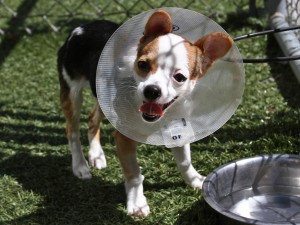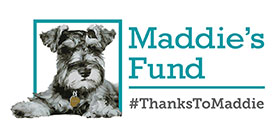

Petey, if he could talk, would tell you about the strength of compassion. That and teamwork can carry you a long way toward remedying a difficult situation. And Petey, to say the least, has certainly found himself in a difficult situation–one that, thanks to both compassion and teamwork, may yet land the small dog in a much better place than wherever he has been.
This Chihuahua terrier mix was recently abandoned at Oakland Animal Services (OAS). OAS staff didn’t need to spend much time with the newly arrived but spunky tri-color boy to know something was wrong. His tail, instead of being centered over his hindquarters, was all the way to one side. And a quick look at his underside further revealed that his penis wasn’t normal either, and it appeared as if he were urinating out of a hole in his back.
The veterinarians at OAS determined that “Petey was sweet, definitely socialized, and loved at one point. He looked like a healthy guy until we examined his belly and below his tail,” Martha Cline, animal care coordinator, related. “But Petey had not developed normally as a fetus and was born with a congenital defect called perianal hypospadias. His urinary and reproductive systems didn’t fully form. His tail deviated to the left, his anus wasn’t quite normal, and where his penis and prepuce should be, there were only remnants.”
Furthermore, doctors discovered, Petey’s urethra, the tube that carries urine from the bladder out of the body, ended just below the anus, which was more in keeping with what one might expect to see on a female. The urethra, the vets and vet technicians noted, should have continued down and around the dog’s pelvis, inside the penis and prepuce, facing forward between his legs. But for Petey it didn’t.
OAS medical personnel referred Petey to Dr. Tim Sellmeyer at VSA in Dublin. From his review, Sellmeyer recommended that Petey be placed in a foster home where his routine could be observed. If it was determined that he was able to urinate and defecate normally, as everyone hoped, Sellmeyer felt the small dog would be an excellent candidate for surgery.
After a short stay in foster care, Petey’s foster mom reported back that he was doing well and was able to control his own elimination needs—as an indoor dog would be expected to do. It was at that point that Friends of Oakland Animal Services—the foundation arm of OAS—agreed to pay the cost of the discounted surgery at VSA. And Dr. Sellmeyer did a wonderful job; Petey is nearly completely healed now and, hopefully, will be up for adoption in about a week!
“Petey will continue to need some care to help him stay clean,” Cline points out. “He can’t control his urine stream like a normal boy and sometimes gets urine on his legs. But he will make a wonderful addition to any home.”
Relating Petey’s story of success in a few paragraphs doesn’t seem adequate to the amount of compassion and teamwork it has taken to get him to this point—the thought, the caring, the effort, the know-how. But what it does express well—and certainly Petey would relate this, too—is something about the strength that comes from the convergence of compassionate, like-minded people. It can be an almost unstoppable force . . . and Petey is the better for it.
